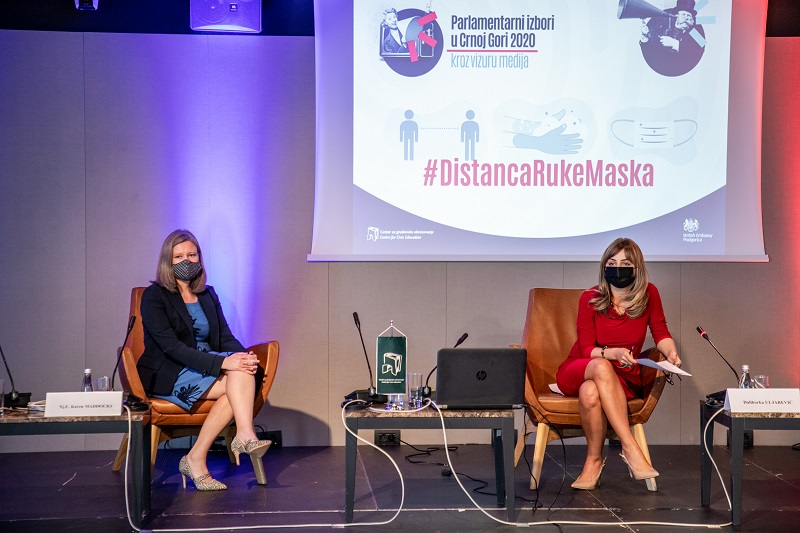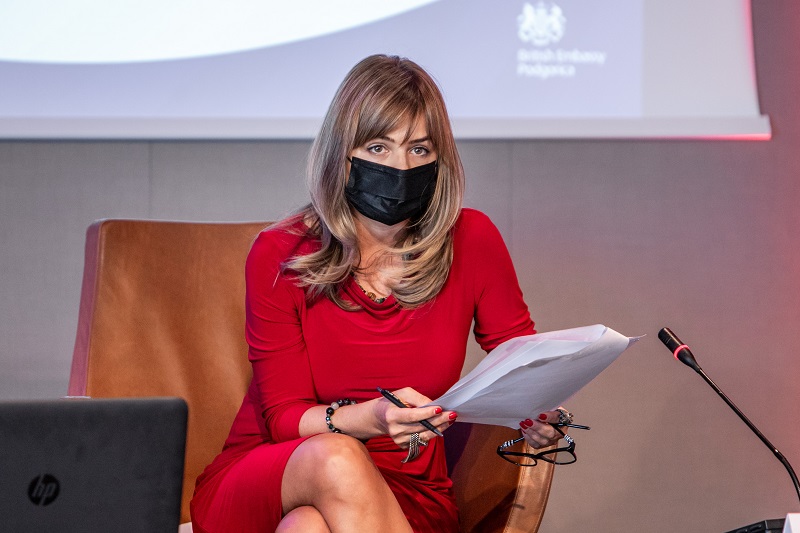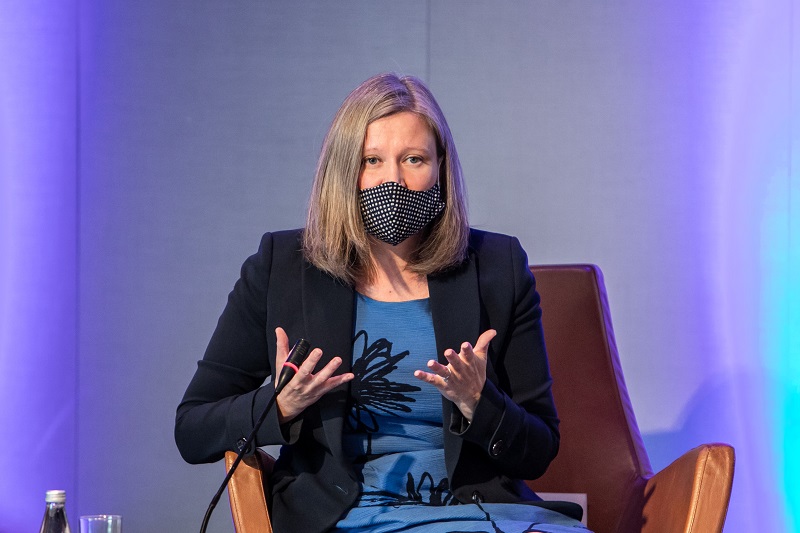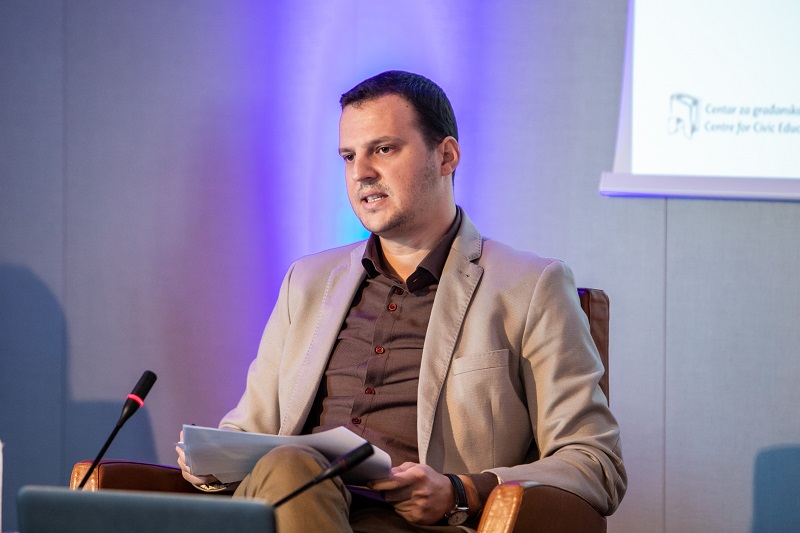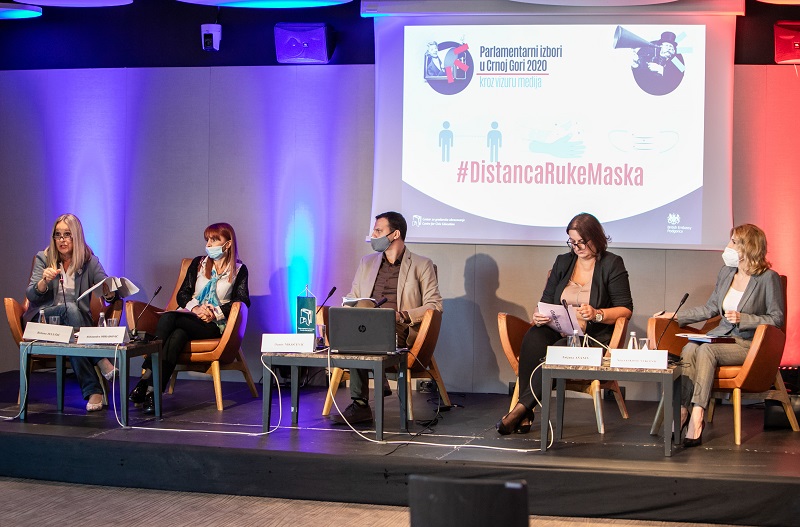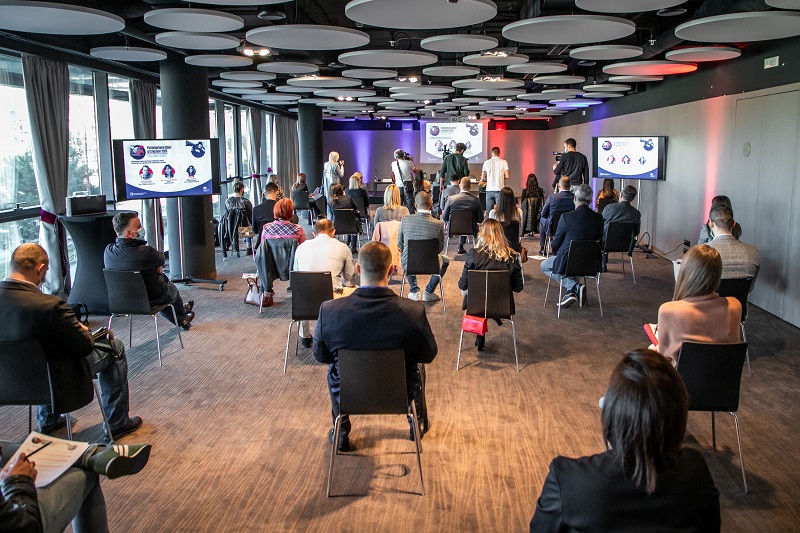Podgorica, PR press service – There were almost no media in Montenegro that reported neutrally and objectively about all electoral lists during the campaign for the parliamentary elections held on 30 August, as assessed by the Centre for Civic Education (CCE).
Today, that non-governmental organization organized the conference “Parliamentary elections in Montenegro 2020 through the media”, at which the final findings of monitoring the election campaign through the media, social media and comments from readers on the portals were presented.
Executive Director of the CCE, Daliborka Uljarević said that the research confirmed the previously emphasized deep polarization and politicization of Montenegrin media, stating that it does not contribute to objective informing of citizens, “which is crucial for the development of political culture and greater voter participation, and consequently, their elections based on the power of arguments”.
According to her, the media were often, folllowing their editorial policies, benevolent towards certain “and very critical or even hostile towards other political entities”.
“The research indicated that there were almost no media that reported neutrally and objectively about all electoral lists, and it is evident that special sensitivity was demonstrated towards minority parties,” Uljarević pointed out.
She emphasized that again there was present so-called functionary campaign, i.e. visible involvement of state officials in the campaign, as well as, as she stated, the use of state resources, which has already been defined in international reports as an “institutional advantage”.
“In the comments, there is present insulting of persons on a national and gender basis, but also insulting insinuations on a personal basis. Recently adopted legal solutions, upon the CCE’s initiative regarding comments on online media, must come to life to decontaminate this space from inappropriate content, and thus contribute to the promotion of a healthier social debate” said Uljarević reflecting on comments of readers on the news portals.
Facebook, she stated, may have become a key battleground for the votes of the undecided in these elections. “Announcements have become more creative, and there is a greater investment of electoral lists in this type of political marketing. The growing influence of meme pages, which were openly politically classified and became agitators of certain political options, is especially noticeable” said Uljarević.
“The change made in the parliamentary elections is an important indicator of the democratic maturation of Montenegro, but also the basis for substantial democratization and Europeanization of our society and in that direction continuous and open dialogue of all actors must be the basic mechanism,” Uljarević concluded.
The Ambassador of the United Kingdom to Montenegro, Karen Maddocks said that Montenegro followed the global trend in political campaigns, by turning from traditional media to online space.
“It has created more opportunities for people to get involved in the electoral process and to get involved in politics, but it has also raised several very important questions about how ready our regulatory frameworks are to protect fundamental values and rights in this online space” stated Maddocks.
She pointed out a frequently asked issue that is that technology is moving faster than regulatory frameworks, stating that this means that media monitoring during the election process is gaining in importance, which was one of the reasons for supporting the CCE project within the broader programme of monitoring the parliamentary elections in Montenegro.
The CCE’s Development Coordinator, Damir Nikočević explained by introducing a summary of findings that the monitoring included six televisions – RTCG, Vijesti, Prva, Nova M, TV 7 and A1, four dailies – Vijesti, Dan, Dnevne novine, Pobjeda, as well as eight portals – Vijesti, CdM, IN4S, Analitika, RTCG, Antena M, Pobjeda, Borba.
He said that most of the announcements on the topic of the parliamentary elections by the end of August had portal Vijesti – 763 announcements, while TV7 had the least – 65 announcements. “If we would disaggregate that by the type of media, the most announcements had by TV Vijesti, in the domain of print media it was daily Dan, and from the portals Vijesti portal. In the election campaign, the most common topics were the rule of law and identity issues, while women’s rights were the least discussed. Culture and sports were also very little discussed,” Nikočević said.
He said that identity issues were represented within the Democratic Party of Socialists (DPS) than all other topics together, for the coalition “For the Future of Montenegro” the most common topic was the rule of law, for the “Black on White” list it was the fight against corruption and organized crime, for the Social Democratic Party economic development was in focus, for the Social Democrats also identity issues and for the coalition “Peace is our nation” were general political issues, and the fight against corruption and organized crime.
“The most frequently mentioned words are Montenegro, DPS, elections, Đukanović, State Election Commission and citizens. The lists of national minorities mostly addressed their electorate, so the names of those national groups were the most frequently mentioned words in their presentations,” Nikočević stated.
Reflecting on the media presence of the electoral lists, Nikočević reported that the DPS had the most announcements – around 3.400, while the three coalitions that now have a majority in the Montenegrin Parliament had 3.285 announcements, and the Croatian Civic Initiative (HGI) is at the bottom of the list.
“When we talk about media announcements in relation to the tone, the campaign “Decisively for Montenegro” was convincingly the most negatively reported, which is not a surprise considering that the DPS acted from the position of the government and the opposition’s edge was directed towards them,” Nikočević elaborated.
The three coalitions – “For the Future of Montenegro”, “Peace is our nation” and “Black on white” – have, as he added, more positive announcements in the media than neutral and negative ones, while there were almost no negative announcements about minorities in the media.
“We have analyzed 96 front pages and it is noticeable that those who reported positively about the activities of the until recently ruling party, reported negatively about the three opposition lists, which confirms the media polarization in Montenegro,” Nikočević said.
As he stated, the dailies Dan and Vijesti had 21 predominantly negative front pages concerning the DPS, while Pobjeda and Dnevne novine had 17 dominantly negative front pages concerning the three coalitions of the new parliamentary majority.
„The coalition “Peace is our nation” had the most positive announcements, according to the type of media, on TV Vijesti, in the daily Dan and on the portal Vijesti. The same refers to the coalition „Black on White“. Furthermore, the coalition “For the Future of Montenegro” had the most positive announcements on TV Vijesti, in the daily Dan and on the IN4S portal“. DPS had the most negative announcements on the IN4S portal, in the daily Dan and on TV Vijesti, and the most positive ones on TV Prva, Dnevne novine and the Cafe Del Montenegro portal” Nikočević specified.
Speaking about the seconds that the electoral lists received in the central, news and out of news programme shows, Nikočević said that the DPS got the most space on TVCG, and HGI the least.
“On TV Vijesti, the coalition “For the Future of Montenegro” got the most space in the central-news and debate shows, while HGI and the Albanian coalition “Unanimously” were not represented. The DPS did not participate in the debate programmes, except through a representative from their list from the Liberal Party” Nikočević stated.
On TV Prva, as he said, most of the space was dedicated to the DPS and the least to HGI.
“DPS was mostly represented on TV Nova M, while two Albanian lists and the Croatian Reform Party were not represented. The coalition “For the Future of Montenegro” was the most represented on TV A1, and there were no minorities,” Nikočević said.
As he said, when it comes to the dailies, the coalition “For the Future of Montenegro” got the most space in Vijesti, DPS in Dnevne novine, the coalition “For the Future of Montenegro” in Dan and DPS in Pobjeda.
“In the part of violations of the election silence, the largest number of violations was recorded at the IN4S portal – 44 violations in two days,” Nikočević said.
Journalist and analyst on the project, Vesna Rajković Nenadić said that monitoring encompassed eight portals that are selected according to the criteria of reach/readership or influence.
“On a daily basis, one or two of the most read/commented articles on election issues as samples were taken for processing, where there are counters on the portals or the most relevant according to analysts where there are no counters on the portals. A total of 24.286 comments were analyzed on 418 texts or an average of about 950 comments per day in the period from 5 to 30 August 2020.“
“The spaces for comments on the portals in Montenegro during the election campaign were mostly a training ground for the propaganda of organized political groups. The level of argument based discussion was extremely low. The portals IN4S and Borba were in the lead in that regard,” Rajković Nenadić stated.
She said that in most of the comments, the narrative of support or criticism of a certain political group dominates. “All analyzed portals had comments with elements of illegal content, although in different volumes. The analysis indicated that about 50 percent of the analyzed articles had comments with controversial content. There were examples that all comments on one text contain controversial content – from severe insults to hate speech,” said Rajković Nenadić.
In the comments, as she pointed out, insults of persons on a national, gender basis, as well as on a personal basis, are especially present.
Rajković Nenadić said that the media must work on improving the capacity and ensure that there are specialized moderators in each newsroom who exclusively deal with the moderation of comments.
Deputy Editor-in-Chief of the CDM portal, Aleksandra Obradović, during the panel “Montenegrin media in the election campaign – were citizens objectively informed and were election actors treated fairly?“, said that this year’s election campaign was shortened due to COVID19, that all parties used extensively press releases and there was not much direct contact, as well as that the media maintained the previously established editorial policies.
“We noticed that this year there were a lot of comments on our portal, which has not been the case so far. It is noticeable that there were very few topics about education, which is inadmissible,” Obradović said.
Member of the Parliament of Montenegro and member of the Political Council of URA, Božena Jelušić assessed that she waited for this year’s parliamentary elections with considerable fear and “that fear was completely justified”.
“The fact is that participatory media do not contribute to participatory democracy, and it was clear that these elections were mostly won through the media. This means that they gained greater financial power and financial influence, which is also a global trend. However, it seems to me that those countries that have public broadcasting services must take into account the fact that those public services should primarily be in the service of the citizens,” Jelušić pointed out.
On the global scene, as she pointed out, there is a crisis of news media in favor of entertainment. “Instead of a real social agenda, we had religious protest walks as the leading reporting point. The fact that the campaign was predominantly transmitted to the Internet and that new digital media increased not to the possibility for sharing arguments lead to the transformation of citizens into a silent group,” assessed Jelušić.
“We have seen that there are practically no comments where there are no violations of legal norms. This seems like an apocalyptic picture, but it is not something that only Montenegro faces. It is a global problem. You know that President Trump is being called the first Facebook president and that this is something that has contributed to completely unexpected votes in some other communities. The political landscape in such a media environment will change,” said Jelušić.
Therefore, she believes, it is necessary to find regulatory mechanisms that will return the arguments to the citizens, which will reduce all problems to a measure that can be controlled.
Jelušić said that the Public Service must create a different agenda, that the first and most important responsibility is on it since it is paid by all citizens, whereas commercial media can declare whom they prefer “but if they want to be trusted, they must demonstrate the necessary balance.”
She asked what would happen to the media, and whether those who justifiably entered the fight against the captured information system would be open, balanced, and create justified social agendas.
“As a woman, I feel completely betrayed in these elections. The fact that I disappeared, that my voice stopped being heard, that the negotiations are male, that the media talk little about it, that they do not care – does not encourage,” said Jelušić.
Member of the Democratic Party of Socialists, Nela Savković Vukčević believes that there is no place for comment that there is no freedom of expression and media pluralism in Montenegro, and that this is supported by the data from the research according to which during the pre-election campaign total of 1907 media announcements had a negative tone about the DPS.
“DPS had 157 announcements through which the programme was promoted, while other lists together had 146 such announcements. This data shows that the DPS led a positive campaign and was focused on what is predominantly its election promises,” said Savković.
Furthermore, she said that she hopes that the influence of the media from other countries will also be the subject of some of the next analyzes.
“Which is really inappropriate, undemocratic, almost unseen in terms of intensity, so I believe that it will be the subject of some analysis and contribute to a better understanding of the abundance of all these information that we have heard today,” stated Savković.
Editor-in-Chief of TV Vijesti, Tatjana Ašanin said that the media had one “handicap” in this campaign because the pandemic made it impossible for the media to cover gatherings, tribunes, direct political presentations.
“We were getting material from political parties and edited following our editorial policy. There was also talk if this introduced political marketing into the reporting form, but I think that is a too harsh assessment. Namely, if you process the material you received without the dictates of the party how you will do it, then I think we cannot talk about political marketing,” Ašanin explained.
She pointed out that the media in Montenegro, during the pre-election campaign, generally followed their principles of editorial policy, and that TV Vijesti did the same. “Our key leading idea is the public interest in everything, because if that is not the case, then we would lose the compass. We have a story today that is very important, and this story is not just about the election campaign but the media and social environment. It is astonishing to me, I must admit, that a representative of the Public Service, which employs about 750 people and has so many editors, did not show up here,” said Ašanin.
She underlined that during the pre-election campaign, the abuse of resources and the institutional advantage of the DPS were noticeable. “The fact that the officials of the ruling party worked in the pre-election campaign got a real meaning in the media expression. We had works and constructions as in some post-revolutionary era, and not in the era of the pandemic,” concluded Ašanin.
The conference was held with the support of the United Kingdom, and following the measures and recommendations prescribed by the National Coordinating Body for Infectious Diseases.

